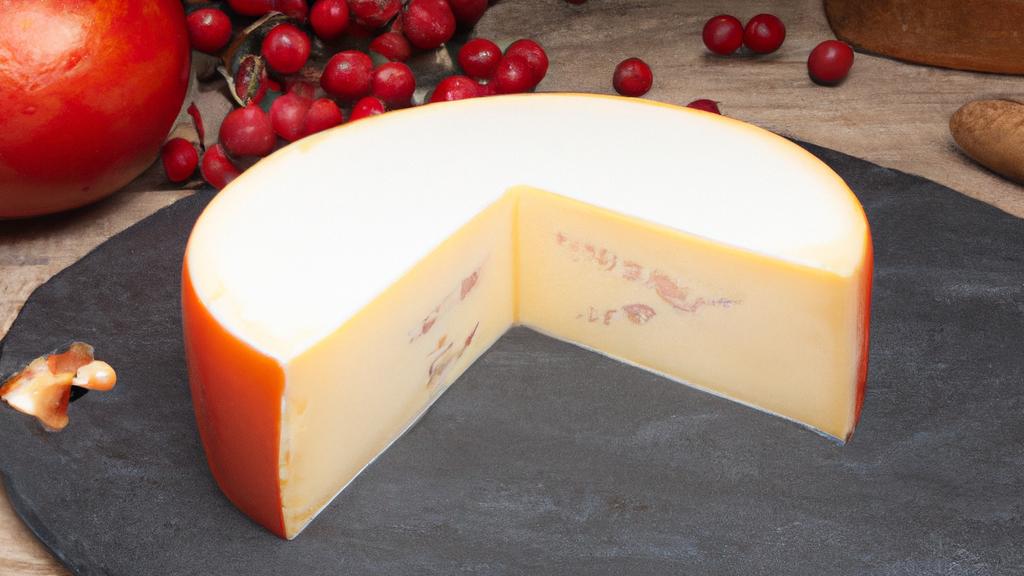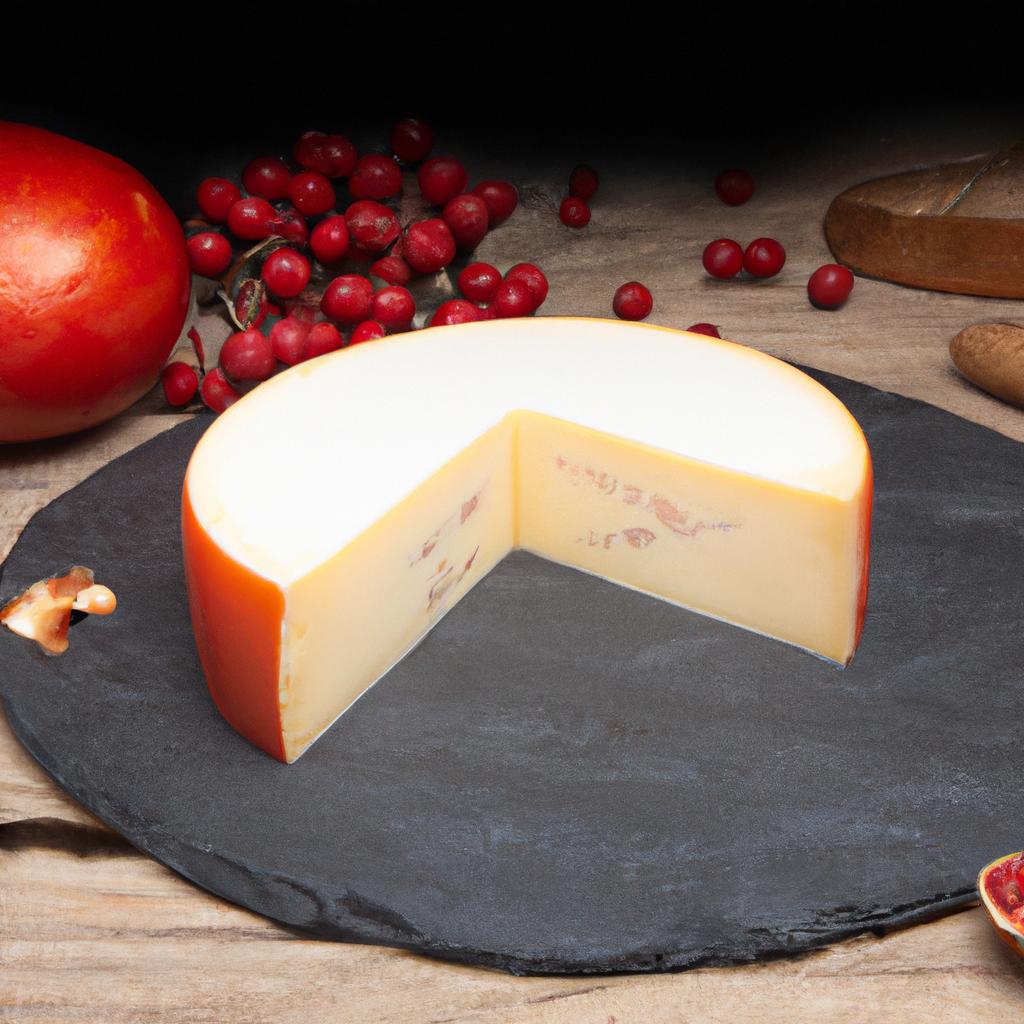
Rich in tradition and savour, Jibneh Arabieh is a staple in Middle Eastern cuisine, coveted for its versatility and unique character. Originating from the Arabian Peninsula, this semi-hard white cheese brings with it a legacy of authentic Arabian cheese-making methods and a cultural importance stretching back centuries. With its creamy, slightly salty, and often tangy notes, Jibneh Arabieh offers an intriguing flavour profile that sets it apart from the crowd.
Jibneh Arabieh is made from pasteurised cow, goat, sheep, or a combination of these milks. Its flavor and texture vary from one region to another depending on these varieties of milk and their proportions. The culinary dexterity of this cheese is truly impressive. It is used in countless dishes, ranging from scrumptious savoury to delightful sweet ones. Sliced thin and paired with fresh tomatoes and flatbread for breakfast, diced into salads, or melted atop hot dishes for a gratifying cheesy seal – Jibneh Arabieh can do it all.
In terms of nutritional value, Jibneh Arabieh is an excellent source of protein and calcium. Additionally, its lower moisture content gives it a longer shelf life compared to many other cheese variants. Here is a quick breakdown of other significant features this cheese holds:
- Melting capacity: Due to its semi-hard nature, it melts easily and smoothly, making it excellent for cooking and baking.
- Variety of forms: Jibneh Arabieh is available in many forms. It can be found in wedge-form or be bought as an entire wheel for larger uses.
- Pairing with drinks: To fully appreciate the flavors of this cheese, it is often paired with light, crisp white wines or robust red wines.
Thus, for anyone looking for an exceptional cheese that goes beyond merely being a topping, Jibneh Arabieh is a must-try. It is not only a cheese; it is a slice of Arabian tradition gracing dishes with its delightful presence and bringing centuries-old culinary customs to your palate.
Welcome to our quiz about Jibneh Arabieh, a traditional cheese from the Middle East! Test how well you know this unique food and its characteristics. Are you ready to challenge your culinary knowledge? Let’s get started!

Exploring the Richness of Jibneh Arabieh: Ingredients, Properties, and Varieties
Jibneh Arabieh, or Arab cheese, is a staple in many Middle Eastern cuisines, offering a distinctive taste and texture that have been cherished for generations. This white brine cheese is known for its versatility, finding its place atop a variety of dishes or enjoyed on its own. Carefully crafted using pasteurized cow’s milk, rennet, salt, and sometimes even herbs for additional flavoring, Jibneh Arabieh has a slightly salty, tangy taste that is both refreshing and savoury. Its semi-hard texture, a result of processing that includes salting, churning, boiling, and aging, complements its flavorful attributes, rendering it a beloved cheese of the region.
The characteristics of Jibneh Arabieh vary depending on the region of its production, enhancing its culinary diversity. In fact, differing preparation techniques across these regions contribute to the varied characteristics observed in this cheese. For instance, the Lebanese version of Jibneh Arabieh generally exhibits an unripened, mild profile with a soft, rubbery texture. On the other hand, in Jordan and Palestine, the cheese is typically aged with an increase in its salt content, revealing a more pronounced, sharper taste and firmer texture.
While Jibneh Arabieh is often enjoyed fresh, its aging process brings about intriguing variation in flavors. Fresh Jibneh Arabieh often carries a delicate, underpinning sweetness that juxtaposes its dominant salty profile. As the cheese ages, however, this sweetness subsides, giving way to a robustly savory and complex flavor spectrum.
- Lebanese Jibneh Arabieh: Soft and mild, perfect for sandwiches and pastries
- Jordanian and Palestinian Jibneh Arabieh: Aged and saltier, ideal for mezze platters and salads
Ultimately, the intricacies that surround Jibneh Arabieh, from its ingredients to its regional varieties, contribute to its esteemed status in Middle Eastern culinary culture. And so, the journey to explore the world of cheese keeps offering delightful surprises with treasures such as Jibneh Arabieh.
The Delicious World of Jibneh Arabieh: Exploring the Flavors of the Middle East
Jibneh Arabieh, meaning “Arab cheese” in Arabic, is a delightful cheese that hails from the Middle East, particularly Lebanon, Syria, and Jordan. If you’re a cheese connoisseur craving something unique and exotic, Jibneh Arabieh is worth adding to your cheese board.
This traditional Middle Eastern cheese is a beloved staple in the region’s culinary culture, with a history stretching back centuries. It is made from cow’s or sheep’s milk, sometimes even a combination of both, and is typically aged for no more than a couple of weeks. The cheese has a soft and smooth texture and a mild, slightly tangy flavor.

Jibneh Arabieh is incredibly versatile and can be enjoyed in a variety of ways. It pairs wonderfully with fresh fruits, olives, and crusty bread. It’s also a fantastic ingredient in traditional Middle Eastern dishes like manakeesh (flatbread topped with cheese and herbs) and kunafa (a sweet pastry made with cheese and syrup). This cheese is a true culinary gem that embodies the rich flavors and cultural heritage of the Middle East.
- Jibneh Arabieh is a traditional Middle Eastern cheese made from cow’s or sheep’s milk.
- It has a soft and smooth texture with a mild, slightly tangy flavor.
- This cheese is incredibly versatile and can be enjoyed on its own or used as an ingredient in various Middle Eastern dishes.
- It pairs well with fresh fruits, olives, and crusty bread.
- Did you know?: The Jibneh Arabieh cheese is usually made from cow, goat, or a mix of cow and sheep milk.
- Fun fact: Jibneh Arabieh actually originates from the Middle East, not Israel.
- Interesting tidbit: This cheese is often used in cooking Arab cuisine because of its saltiness and flexible texture.
- Surprise fact! Jibneh Arabieh cheese is often enjoyed fresh and does not undergo a long aging process.
- Fact: The cheese Jibneh Arabieh is typically served with fresh herbs, tomatoes and olives.
- Info: It is frequently used in sandwiches and salads.
- Knowledge Bomb: Jibneh Arabieh is actually compared to Feta cheese because of its salty flavor.
A Culinary Journey with Jibneh Arabieh: Savory Cheese Pies and Refreshing Cheese Salad
Jibneh Arabieh, an iconic Middle Eastern cheese, is a staple in many Arabic kitchens. Famous for its versatility, this white cheese has a softer texture and a mildly salty flavor which is perfect for a wide array of dishes. To truly admire the exquisiteness of Jibneh Arabieh, we invite you to explore two of its finest uses – a comforting Arabic cheese pie and a refreshing cheese salad. Both dishes allow Jibneh Arabieh to shine, showcasing its unique characteristics that make it such a beloved cheese among culinary enthusiasts.
The Arabic cheese pie, also known as Fatayer, is a very popular Middle Eastern dish. The cheese filling is traditionally made with Jibneh Arabieh, onions, and parsley, enclosed in a dough. The combination of the soft cheese and the aromatic herbs wrapped in a perfectly baked dough offers an experience of delightful contrasts.
- Cheese Pie ingredients: 2 cups all-purpose flour, 1 teaspoon instant yeast, 1/2 cup warm water, 1/2 cup olive oil, 1/2 teaspoon salt, 1 cup shredded Jibneh Arabieh, 1/4 cup chopped onion, 1/4 cup chopped parsley.
- Preparation:
- Dissolve yeast in warm water and set aside for 10 minutes
- In a large bowl, combine flour, olive oil, and salt. Add the yeast mixture and knead until elastic. Let the dough rise for about 1 hour.
- Meanwhile, mix together cheese, onion, and parsley.
- Preheat the oven to 350°F (175°C). Divide the dough into small balls, roll out each one, and place the cheese mixture in the center. Fold the dough over the filling and pinch to seal.
- Bake for about 15 minutes, or until the pies are golden brown.
Next, the refreshing cheese salad is a healthy and light dish that truly highlights the mild and creamy texture of Jibneh Arabieh. The combination of fresh vegetables, olives, and walnuts offers a multifaceted taste experience, with the cheese subtly enhancing the flavors of the ingredients.
- Salad ingredients: 2 cups mixed greens, 1/2 cup cherry tomatoes, 1/2 cup sliced cucumber, 1/4 cup olives, 1/4 cup walnuts, 1/2 cup crumbled Jibneh Arabieh, 1/4 cup olive oil, juice of 1 lemon, salt, and pepper to taste.
- Preparation:
- In a large salad bowl, mix together greens, tomatoes, cucumber, olives, and walnuts. Add the Jibneh Arabieh.
- In a separate bowl, mix together olive oil, lemon juice, salt, and pepper to make the dressing. Pour over the salad and gently toss.
These two dishes not only provide a delightful taste of Jibneh Arabieh but also present an opportunity to explore the depth of Middle Eastern culinary traditions.
Perfect Pairings: Honour the Tradition of Jibneh Arabieh with Exquisite Wines and Dishes
Most recognized in the Middle East and North Africa, Jibneh Arabieh is a stellar cheese, creamy with a light, briny flavour that can vary in strength depending on its age. Despite being known as a household staple, many are unfamiliar with how to fully exploit its gastronomical potential. By fine-tuning your wine and food pairings, you can elevate your enjoyment of this versatile semi-hard cheese to a true culinary experience.
Jibneh Arabieh’s mellow taste performs marvelously with various accompaniments, and when considering wines, light to medium-bodied varieties typically work best. An excellent choice would be a Chenin Blanc – its crisp, orchard fruit notes and hint of sweetness perfectly balances the saltiness of Jibneh Arabieh. Alternatively, a classic French Chardonnay, with its rich and creamy taste, would intricately harmonise without overwhelming the subtle notes of the cheese. For those who prefer reds, a light Pinot Noir, with its delicate, fruity flavour profile, can complement Jibneh Arabieh’s grassy undertones exquisitely.
Food parings, on the other hand, should underscore the cheese’s subtleties rather than overshadow them. Here are some dipped-in-tradition recipes that, while retaining their unique identity, succeed in elevating Jibneh Arabieh’s charm:
- Mankoushe: A traditional Lebanese flatbread often eaten for breakfast, Mankoushe enhances the cheese’s creamy texture. Jibneh Arabieh’s milder version is an ideal cheese to be used in this dish.
- Fattoush: This light and refreshing Lebanese salad, with crisp cucumbers, juicy tomatoes, and a punchy sumac dressing is a delightful companion for Jibneh Arabieh. The cheese becomes an additional layer of texture and creaminess, interacting beautifully with the salad’s acidity.
- Mediterranean Mezze Platter: Middle Eastern charcuterie boards shine with Jibneh Arabieh at their heart. Paired with ripe tomatoes, cucumber, falafel, hummus, and olives, this cheese will tie the board together, creating a mosaic of flavours that will dazzle your guests.
The beauty of pairings lies not just in how each element complements the other, but in how they interact and build up an experience greater than the sum of its parts. By considering these pairing principles, you can meaningfully broaden your culinary journey with Jibneh Arabieh, finding that this humble household cheese has the potential to star in your next dining experience.
Similar Cheeses for Jibneh Arabieh
Jibneh Arabieh, also known as Arabic cheese or white cheese, is a popular cheese variety in Middle Eastern cuisine. It is a soft, white cheese made from cow’s or sheep’s milk. The cheese has a mild and creamy flavor with a slightly salty taste. Jibneh Arabieh is versatile and can be enjoyed on its own, in sandwiches, or as an ingredient in various dishes.
If you are a fan of Jibneh Arabieh and would like to explore similar cheeses, here are a few options to try:
- Feta Cheese: Feta cheese is a brined cheese made from sheep’s milk, although sometimes it is made with a combination of sheep’s and goat’s milk. It has a crumbly texture and a tangy flavor. Feta cheese is commonly used in Mediterranean cuisine and can be a great substitute for Jibneh Arabieh in salads, pastries, and savory dishes.
- Halloumi Cheese: Halloumi cheese is a semi-hard, unripened cheese made from a mixture of sheep’s and goat’s milk. It has a unique quality that allows it to be grilled or fried without melting. Halloumi has a salty taste and a chewy texture, making it a delicious addition to sandwiches, kebabs, and salads.
- Akkawi Cheese: Akkawi cheese is a soft, white cheese that originates from Palestine. It is made from cow’s milk and has a mild, slightly salty flavor. Akkawi cheese is often used in Middle Eastern pastries, such as knafeh, and can be a good substitute for Jibneh Arabieh in recipes that call for a mild, creamy cheese.
- Nabulsi Cheese: Nabulsi cheese is a semi-hard, brined cheese that hails from Palestine. It is made from cow’s milk and has a distinct salty taste. Nabulsi cheese is traditionally enjoyed with fresh bread, olive oil, and herbs. It can be grated or sliced and used as a substitute for Jibneh Arabieh in various dishes.
Exploring different cheeses can be a delightful culinary journey, and trying similar cheeses to Jibneh Arabieh can help you discover new flavors and textures. Whether you’re a fan of Middle Eastern cuisine or simply enjoy indulging in cheese, these options can be a great addition to your cheese repertoire.
 About the author: Dr. Wolfgang Sender writes on international careers. He is founder of Life-in-Germany.de and Jobs26.com.
About the author: Dr. Wolfgang Sender writes on international careers. He is founder of Life-in-Germany.de and Jobs26.com.



